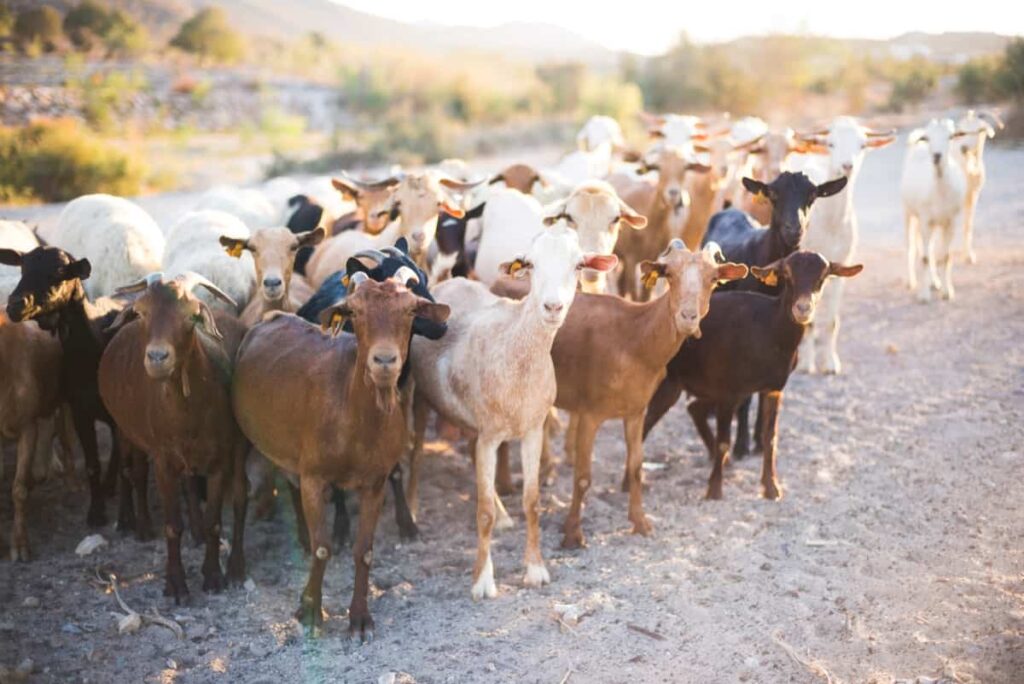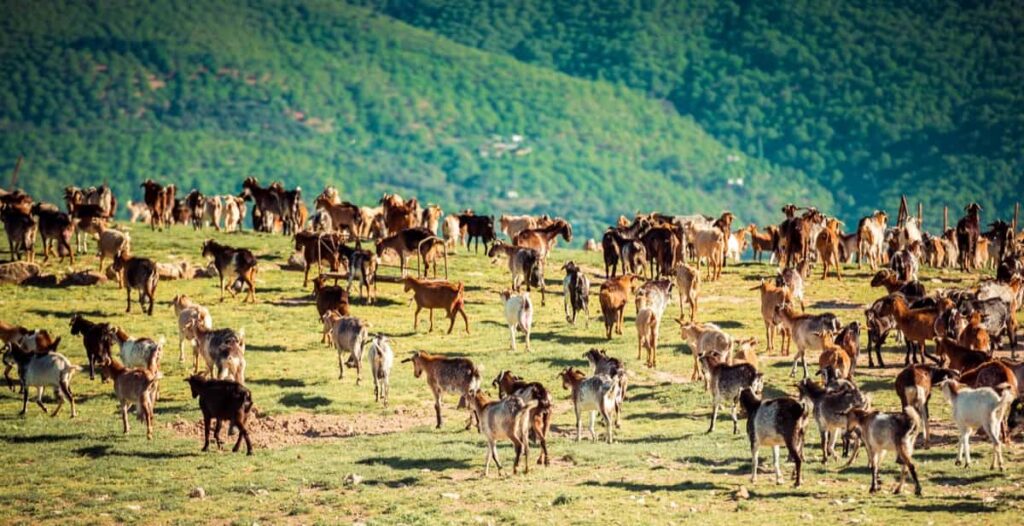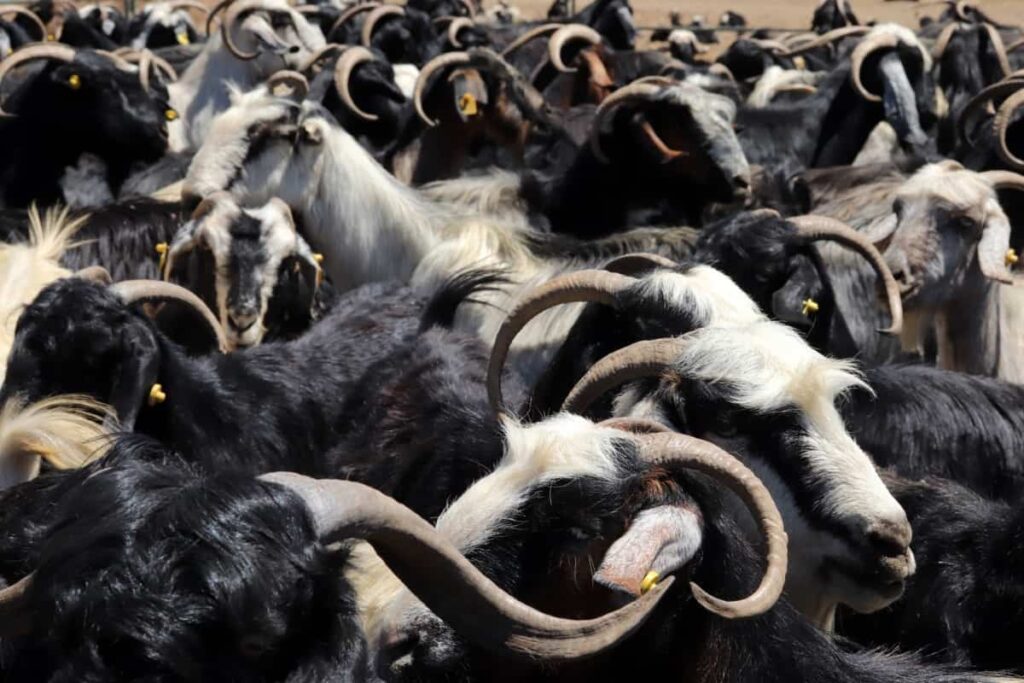Goat farming, also known as goat rearing or goat husbandry, is the practice of raising goats for various purposes, such as meat, milk, fiber, and skin. It involves the management and care of goats in a controlled environment to ensure their health and productivity. Goat farming has gained popularity in India is its adaptability to diverse climatic conditions.

Best Climate for Goat Farming in India
Being a profitable and sustainable venture, goat farming can be practiced in various climatic conditions across India. In general, goats are adaptable animals that can thrive in different climates. However, certain breeds have better tolerance to specific weather conditions. For instance, Jamunapari and Barbari goats are well-suited for hot and dry regions like Rajasthan and Gujarat. They have developed an inherent resistance to high temperatures and scarcity of water.
On the other hand, Malabari and Sirohi goats are more suitable for semi-arid regions with moderate temperatures like Maharashtra or Karnataka. These breeds have adapted to withstand both heat and humidity. Hill areas such as Himachal Pradesh require hardy Himalayan breeds like Gaddi or Changthangi goats with excellent cold tolerance capabilities. It is essential to provide appropriate shelter facilities for your animals. Proper ventilation is necessary during summers, while insulation becomes crucial during winters.
Housing and Fencing Requirements for Goat Farming in India
- Providing proper housing and fencing is essential for the health and safety of your goats. Goats need a shelter that protects them from extreme weather conditions.
- The size of the housing structure will depend on the number of goats you plan to raise. It should have enough space for the goats to move around comfortably.
- The flooring of the goat house should be made with materials that are easy to clean and disinfect, such as concrete or wooden slats. This helps prevent diseases caused by bacteria or parasites.
- Proper fencing is also crucial in goat farming. Fencing keeps your goats confined within their designated area and prevents them from wandering off or getting attacked by predators. Using sturdy wire mesh fencing that is at least four feet high is recommended.
- Remember, providing adequate housing and strong fencing ensures your goats’ safety and contributes to their overall well-being, allowing them to thrive in a controlled environment conducive to optimal growth and productivity.
Feeding and Watering Requirements for Goat Farming in India
- Feeding and watering are crucial aspects of successful goat farming in India. Goats have specific dietary needs that should be met to ensure their health and productivity.
- When it comes to feeding goats, a balanced diet is essential. They need a combination of roughage (such as grass or hay) and concentrated feed (like grains or pellets). It’s important always to provide them with fresh, clean water.
- One key consideration is the quantity of food required per goat. On average, an adult goat can consume around 3-4% of its body weight in dry matter each day.
- Goats are ruminant animals with multiple stomach chambers with unique digestive systems.
- It’s important to regularly monitor the quality of food and water provided to goats. Feeds should be free from contaminants like mold or toxins that could harm the animals’ health.
Breeds of Goats Suitable for Farming in India
- Jamunapari – It known for its high milk production and large size. They adapt well to Indian climatic conditions and can thrive in various regions.
- Beetal goat – These goats are highly valued for their meat quality and fast growth rate. With their distinctive red or black coat, Beetal goats have become a common sight in many farms across India.
- Sirohi goat – These animals produce good-quality milk and have excellent meat yield.
- Saanen breed – These white-colored goats from Switzerland possess exceptional milk-producing capabilities.
- Barbari goat – It is another noteworthy breed that excels in meat production and adaptation to diverse climates. Their compact size makes them suitable for small-scale farmers with limited space.
- Other notable breeds include the Black Bengal goat, Changthangi, Zalawadi, Surati goat, Chigu goat, Anglo-Nubian goat, and Angora goat.
In case you missed it: Best Meat and Milk Goat Breeds in India: Considering these Goats in Commercial Goat Farming Business

Health Requirements for Goat Farming in India
- Health is a crucial aspect of goat farming in India. To ensure the well-being of your goats, you need to focus on several key areas.
- Proper nutrition is important for maintaining goat health. Goats require a balanced diet consisting of roughage, concentrates, and minerals. It’s important to provide ample fresh water to keep them hydrated.
- Regular vaccinations are necessary to prevent common diseases such as foot rot and pneumonia. Consult with a veterinarian to find the appropriate vaccination schedule for your goats.
- Additionally, maintaining clean and hygienic living conditions is crucial. Regular cleaning of pens or sheds helps prevent the spread of diseases among goats. Providing adequate ventilation also helps reduce respiratory issues.
- By prioritizing these health requirements for goat farming in India, you can ensure that your herd remains healthy and productive.
Goat Farming Loans and Schemes in India
Goat farming in India has gained immense popularity due to its numerous benefits. However, starting a goat farm requires investment and financial resources. This is where loans and schemes come into play, providing aspiring farmers with the necessary financial support. The government of India has implemented several loan schemes specifically designed for goat farming. These schemes aim to promote entrepreneurship in the agricultural sector and boost rural livelihoods.
One such scheme is the National Livestock Mission (NLM), which provides credit facilities to individuals interested in setting up goat farms. In addition to government initiatives, various banks, and financial institutions offer loans for goat farming. Small- and large-scale farmers can avail of these loans based on their requirements. The interest rates are typically reasonable, making it feasible for farmers to invest in this profitable venture.
Apart from loans, subsidy programs are available that provide financial assistance for purchasing goats or establishing infrastructure like sheds and fencing. These subsidies help reduce the burden of initial investment associated with setting up a goat farm. Goat farming loans and schemes have played a pivotal role in promoting entrepreneurship in India’s agricultural sector.
Marketing and Economics of Goat Farming in India
With a growing demand for goat meat, milk, and other products, this industry has ample opportunity for profit. The key factor in successful marketing is identifying your target market. Whether you plan on selling live goats, meat products, or dairy products, it’s important to understand who your customers are and what they want. This will help you adapt your marketing strategies accordingly.
In addition to traditional markets such as local butcher shops and restaurants, there is also a growing trend toward online sales platforms. Websites allow farmers to reach a larger customer base and sell their products directly to consumers. When pricing your products, you must consider factors such as production costs, market demand, competition, and quality of your goods.
In case you missed it: Innovative Housing and Shelter Designs for Profitable Goat Farming

Conclusion
Goat farming in Inda provides employment opportunities and rural development and contributes towards food security. It has emerged as a profitable and sustainable business opportunity for many farmers.
- Types of Grass Growing for Goat Farm
- How to Train Goats for Milking: A Beginners Guide
- Goat Milking Practices and Equipment: A Beginner’s Guide
- Goat Farming for Fiber: Producing Mohair and Cashmere
- Maximizing Goat Milk Production: Tips for Dairy Goat Farmers
- Goat Farming as a Family Business: Strategies for Success
- Profitable Kenya Goat Breeds for Commercial Dairy and Meat Business
- Unlock the Secrets of Oberhasli Goat: Discover Raising and Management Practices
- Ultimate Guide to Myotonic Goats: Explore Profile to Raising
HEY THANKS FOR THE INFORMATION.
Wanted to start goat farming and related startup information
helpful information. Thank you.
Good information.